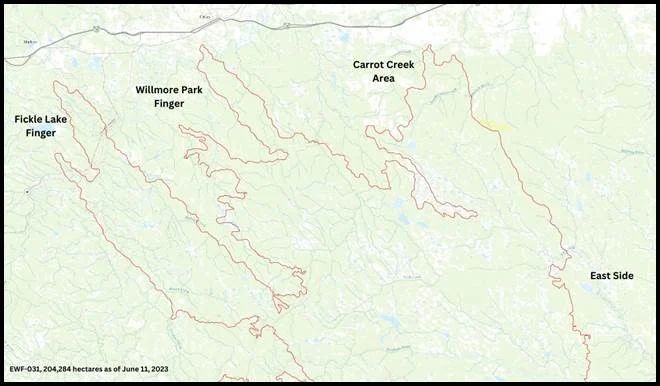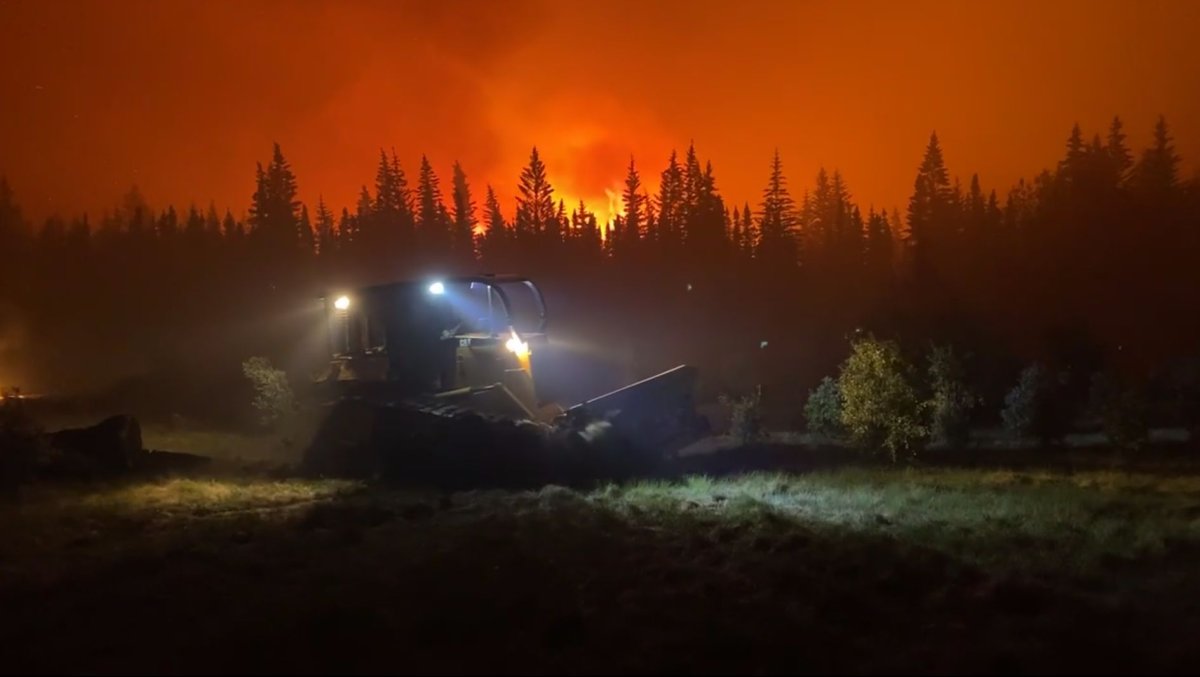It’s been a horrible seven or so weeks fighting wildfires and there is no end in sight, Yellowhead County Mayor Wade Williams said Monday as the region remained under the latest evacuation order.

His fire chief agreed.
“The fires overall have been astronomically challenging,” Yellowhead County fire chief Alberta Bahri said Monday afternoon as helicopters roared overhead, working on the wildfire just 1.5 kilometres from Edson.
The fires in Yellowhead County begin to crop up on April 29 and since then, Bahri said there’s been little respite other than the odd cool day: “That’s a long run — probably some unprecedented time in Alberta alone.”
There have been several large, separate wildfires in the county an hour west of Edmonton in the past month and a half. Crews are tired and it’s daunting work, Bahri said.
“It’s challenging terrain, it’s challenging fighting the fire — everything about it just taxes everybody that’s working on it.”

Residents Selena Wilson and Curtis Wardill hadn’t even unpacked from a wildfire evacuation in Edson last month when another emergency alert was issued Friday evening, ordering everyone to leave town again.
“I’ve kind of had bags kept in the bedroom because I didn’t feel it was a good time to unpack yet with the weather being so crazy,” Wilson said Sunday at a campground east of Edmonton, where she and her husband have taken refuge in their camper, along with their dogs, cats and budgies.
“I just figured we might as well be safe than sorry.”
Friday’s evacuation order was hard to miss, she said. It came over their phones, friends told them about it and the gas station across their street got busy fast.
Wildfires in Yellowhead County west of Edmonton continued to grow Saturday night, a county official said during an online update, but they spread no closer to evacuated communities like Edson.
According to a provincial wildfire report for the region, a cold front tracked across the fire area and brought some precipitation. It was minimal, the report said, but it raised humidity enough to slow the spread of the flames.
Despite the appearance of a lull Sunday, municipal officials in the region said the evacuation orders will stand. On Monday, temperatures increased again and officials said a weather shift was expected to trigger increased fire activity.
Alberta Wildfire said winds Monday are expected 10-15 km/h from the southeast, shifting to 10-15 km/h from the northeast into the evening.
Tuesday will again be hot and dry until a low develops over Alberta into the evening, bringing potentially 15-30 mm of rain through the night and into Wednesday, the province said.
“The conditions have really changed day to day,” Edson Mayor Kevin Zahara said Monday, noting while Sunday was cooler with clear skies, Monday brought a return of the hot, smoky conditions experienced last week.
Yellowhead County officials started the day telling evacuees not to expect to return anytime before Wednesday and as the day went on, the timeline became less clear.
Late Monday afternoon, Williams said he regrets giving any possible timeline, given the unpredictable nature of the fire.
“This, right now is the biggest threat in Alberta and they have thrown, in the last few days, every resource at these fires. There’s just too much at stake here.”

The fire threatening Edson, which began with a lighting strike near the Brazeau Dam at the beginning of May, sped rapidly last Friday through groves of coniferous forest at a rate of 10 metres a minute, becoming fingers that stretched towards Edson, Marlborough, Carrot Creek and other rural communities along Highway 16.
Alberta Wildfire information officer Melissa Story said Monday afternoon the Pembina Complex grew approximately 70,000 hectares from Friday to Saturday and is now about 204,284 hectares in size.

Luc Mercier, the chief operating officer of Yellowhead County, said on Monday there are about 500 people working on the wildfire near Edson. Alberta Wildfire said of those people, 224 are firefighters and 65 are support staff.
Mercier said fire crews on Monday and Tuesday are doing back burning, which sees crews start small, controlled fires along a man-made or natural firebreak in front of a main fire. Back burning reduces the amount of fuel that’s available to the main fire by the time it reaches the burnt area.
“They need to do these back burns to get some of the unburnt timber out of the way, so it minimizes the impact going forward,” Mercier said Monday.
That controlled burn activity is not without risk, however.
“The incident commander is telling us that the risk for this fire moving in different directions in the next two days is extreme and they have recommended that we do not allow any re-entries whatsoever.”
On Monday, the county said permits will be issued to people who need to return to feed animals or collect pets left behind. Those residents are asked to call 1-833-334-4630.
To illustrate how quickly things can change, Mercier on Sunday said officials in the county were considering scaling back their fire response and shutting down their emergency control centre last Wednesday.
“Two days later, that idea went out the door when the fires just went out of control very drastically again,” he said.
This is the second time Edson residents have been forced to flee the wildfires in just over a month. Residents were out for three days in early May.
As of Monday, there were more than 14,000 residents out of their homes due to fires scattered through the northern and western areas of the province.
Officials in Edson have said firefighters are going door-to-door moving flammable items including propane tanks and wood piles away from houses and other structures, as the fire continues to hold about 1.5 kilometres to the town’s south boundary.
Peace officers and members of the RCMP are also doing regular patrols.
Wilson said her doorbell camera captured an officer knocking on her front door.
“Right now, I feel like we’re OK and I’m more concerned about anybody being injured or hurt while they’re firefighting,” Wilson said, while her budgies chirped in the background.
Wardill, who worked fighting the fires last month until he “timed out,” said conditions are volatile. He’s hoping to get permission to go back to the area to check on horses that were staying at another property.
“I’m not a climate alarmist. I’ve fought forest fires on and off for, like, 25 years. It’s been incredibly dry last fall and then we went into this spring with no rain. These fires are reacting in ways that I’ve never seen myself, personally,” he said.
“I know on the frontline there was more than once that the flames overtook our equipment and we were lucky to get out when we did get out.”
Alberta’s largest regulated electricity transmission company had warned residents in areas near the town of Edson to be prepared for extended power outages, saying several transmission towers south of Edson were consumed and toppled by flames.
But AltaLink said in an update later Sunday that wind shifted the direction of the fire and that it did not progress toward its transmission line feeding those areas as anticipated.
The province said it has approximately 2,700 personnel working on wildfires. That includes support from partner agencies across Canada, the United States, Australia, New Zealand and South Africa, as well as the Canadian Armed Forces.
Alberta Wildfire said swing shifts have been established to allow for longer operational coverage on the fireline. Crews are working shifts from 6 a.m. to 8 p.m. and from 12 p.m. to 2 a.m. to work later into the night when the fire is less aggressive.
Beginning Tuesday, Alberta Wildfire said a team will begin working overnight to allow for 24/7 suppression activities on the Pembina Complex wildfires.
“With all of the resources that our municipalities, the province of Alberta, many firefighters from across Canada and across the world are putting onto this fire, we still cannot say that it is safe,” Mercier said Sunday.
“That must tell us all the severity of what we are dealing with.”
Environment Canada, meanwhile, issued special air-quality statements Sunday for a number of Alberta communities, including Edmonton and Calgary, due to smoke from the fires.
— with files from Rob Drinkwater, The Canadian Press
- N.S. mother ‘in shock’ after enduring 17-hour hospital wait with sick baby
- Tories grill Liberals in question period about minister’s ties to lobbyist, PPE company
- The public inquiry into foreign interference is set to present 1st report
- N.S. parent uneasy as institutions for people with developmental disabilities set to close














Comments